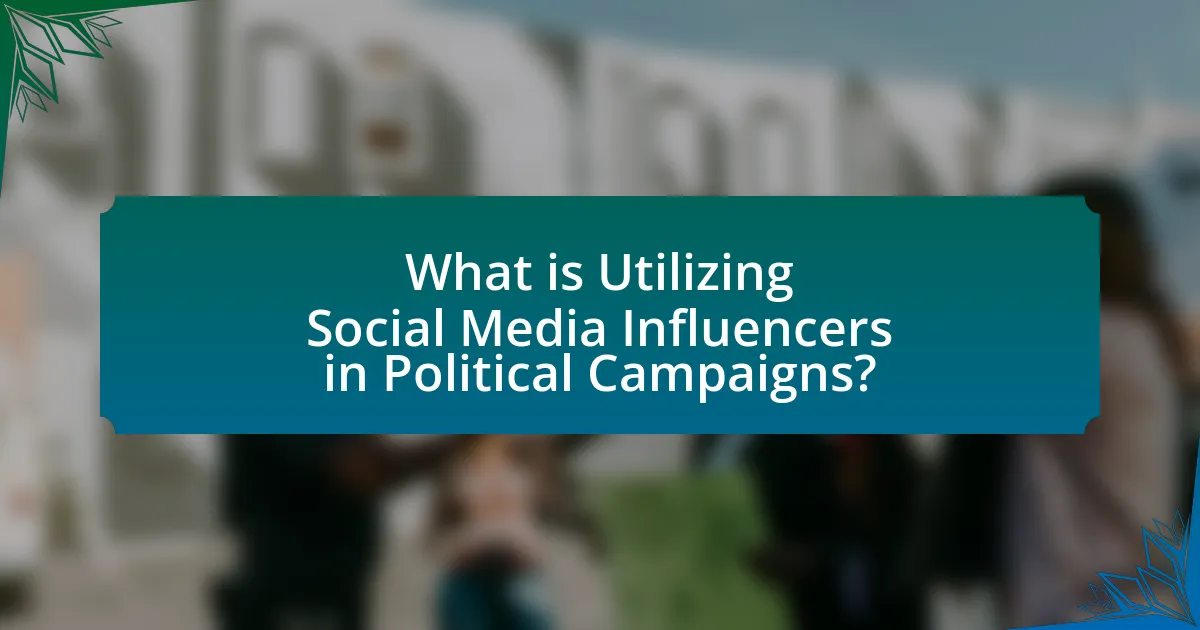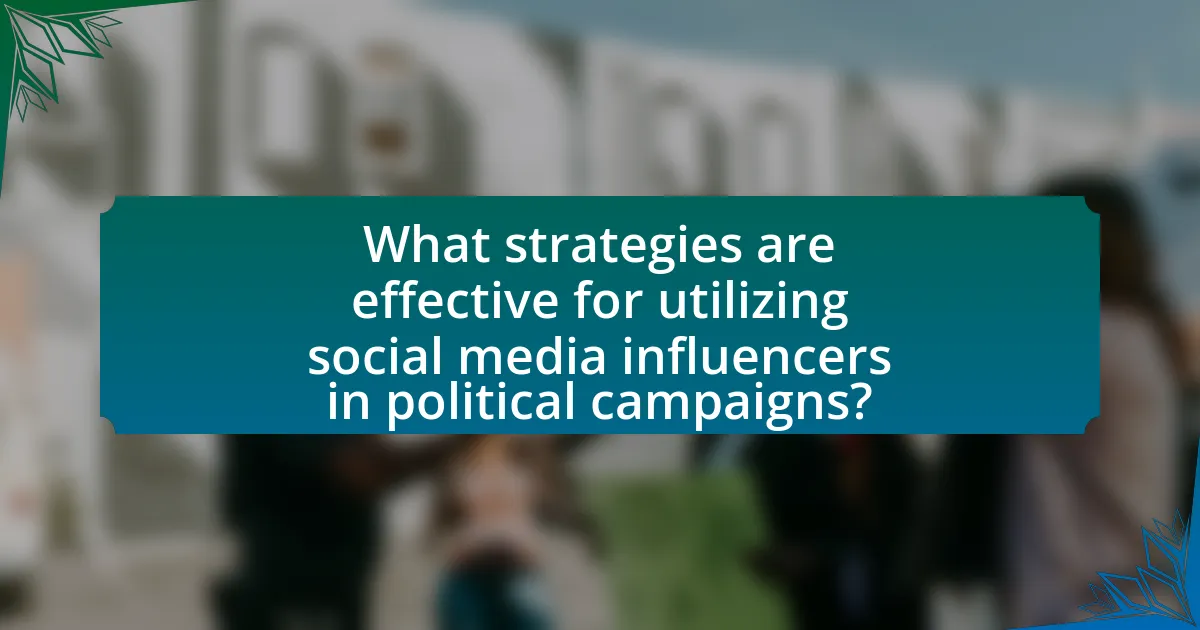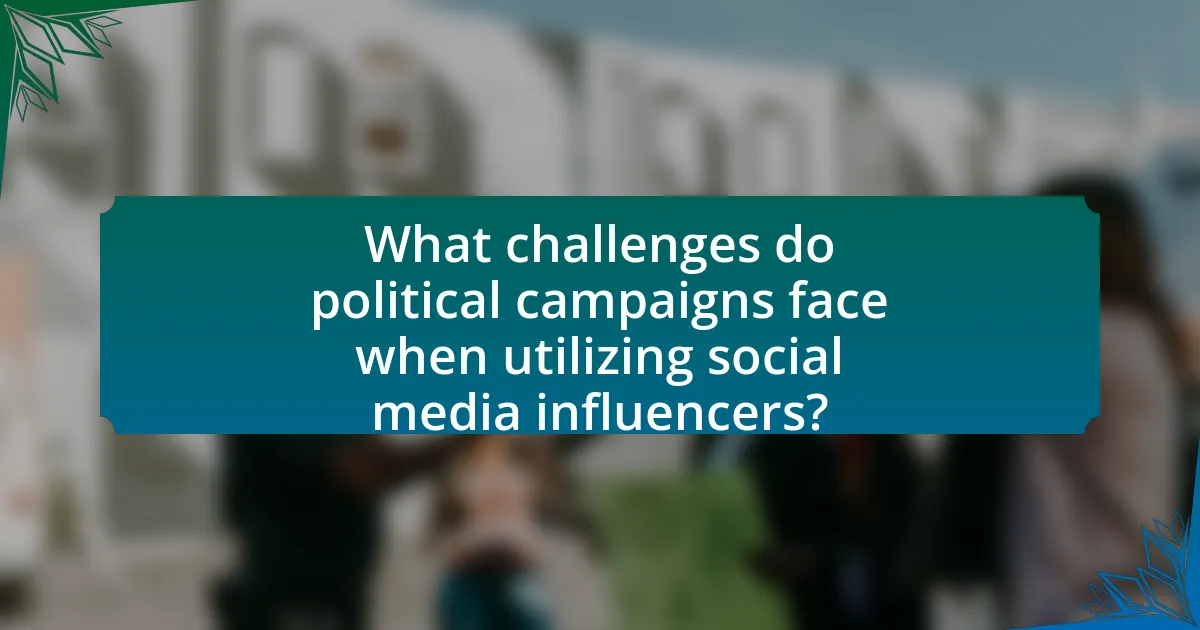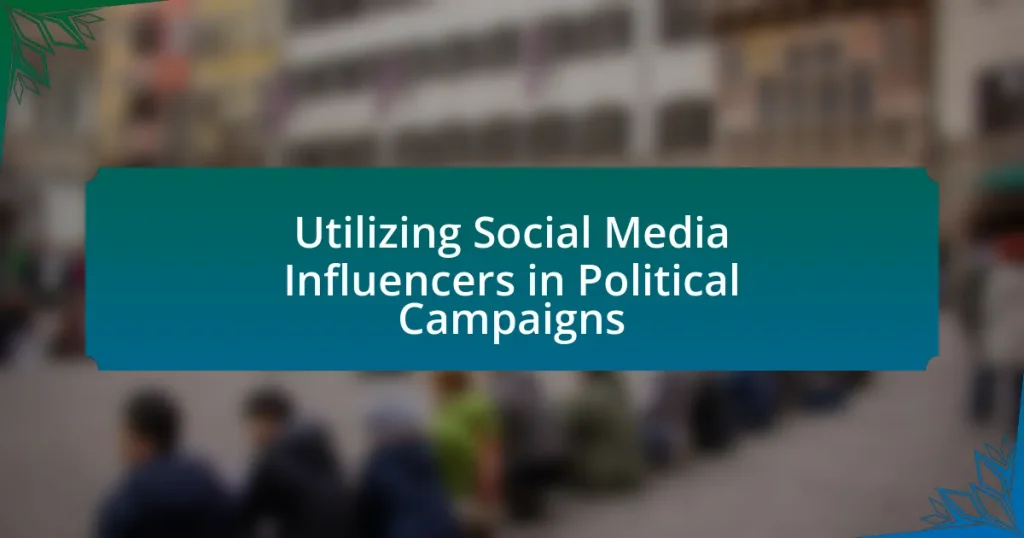Utilizing social media influencers in political campaigns involves leveraging individuals with substantial online followings to promote political messages and engage voters. This strategy enhances voter awareness and participation, particularly among younger demographics who trust influencers more than traditional media. The article explores the impact of influencers on public opinion, effective engagement strategies, and the advantages they offer over traditional campaign methods. It also addresses the challenges and risks associated with influencer partnerships, including authenticity issues and regulatory compliance, while providing best practices for successful collaborations in political contexts.

What is Utilizing Social Media Influencers in Political Campaigns?
Utilizing social media influencers in political campaigns involves leveraging individuals with significant online followings to promote political messages, candidates, or initiatives. This strategy capitalizes on the influencers’ ability to engage and mobilize their audiences, often leading to increased voter awareness and participation. For instance, a study by the Pew Research Center found that 69% of adults in the U.S. use social media, making it a powerful platform for political outreach. Additionally, campaigns that effectively engage influencers can see higher engagement rates, as influencers often have established trust with their followers, which can translate into greater impact compared to traditional advertising methods.
How do social media influencers impact political campaigns?
Social media influencers significantly impact political campaigns by shaping public opinion and increasing voter engagement. Their ability to reach large, targeted audiences allows them to disseminate political messages effectively, often swaying undecided voters. For instance, a study by the Pew Research Center found that 70% of young adults trust influencers more than traditional media, highlighting their credibility among specific demographics. Additionally, influencers can mobilize their followers to participate in political activities, such as voting or attending rallies, thereby amplifying campaign efforts.
What roles do influencers play in shaping public opinion?
Influencers play a crucial role in shaping public opinion by leveraging their reach and credibility to affect perceptions and behaviors. They act as trusted sources of information, often swaying their followers’ views on political issues, products, or social movements. Research indicates that 70% of teenagers trust influencers more than traditional celebrities, highlighting their impact on younger demographics. Additionally, influencers can mobilize audiences for political campaigns, as seen in the 2020 U.S. elections, where social media influencers significantly increased voter engagement and awareness. Their ability to create relatable content fosters a sense of community, further amplifying their influence on public opinion.
How do influencers engage with their audience during campaigns?
Influencers engage with their audience during campaigns primarily through interactive content and personalized communication. They utilize platforms like Instagram, TikTok, and Twitter to create polls, Q&A sessions, and live streams, fostering direct interaction with their followers. For instance, a study by the Pew Research Center found that 72% of teens engage with influencers through comments and direct messages, highlighting the effectiveness of these methods in building rapport. Additionally, influencers often share behind-the-scenes content and personal stories related to the campaign, which enhances authenticity and encourages audience participation. This strategy not only boosts engagement rates but also strengthens the emotional connection between the influencer and their audience, making the campaign more impactful.
Why are social media influencers important in modern political strategies?
Social media influencers are important in modern political strategies because they possess the ability to reach and engage large, targeted audiences effectively. Their established trust and credibility with followers enable them to sway public opinion and mobilize support for political campaigns. For instance, a study by the Pew Research Center found that 72% of teenagers use Instagram, making it a powerful platform for influencers to shape political discourse among younger demographics. Additionally, influencers can create relatable content that resonates with voters, making complex political issues more accessible and engaging. This strategic use of influencers allows political campaigns to amplify their messages and foster community engagement, ultimately enhancing voter turnout and participation.
What advantages do influencers provide over traditional campaign methods?
Influencers provide targeted reach and authentic engagement that traditional campaign methods often lack. Unlike traditional advertising, which broadcasts messages to a broad audience, influencers connect with specific demographics through established trust and relatability. For instance, a study by the Digital Marketing Institute found that 49% of consumers depend on influencer recommendations, highlighting their effectiveness in shaping opinions and driving action. Additionally, influencers can create content that resonates more personally with their followers, leading to higher conversion rates compared to standard advertisements. This combination of targeted outreach and genuine connection makes influencers a powerful tool in political campaigns.
How do influencers help reach younger demographics?
Influencers help reach younger demographics by leveraging their established trust and relatability within social media platforms. These influencers create authentic content that resonates with younger audiences, often using platforms like Instagram, TikTok, and YouTube, where younger users are most active. Research indicates that 70% of teenagers trust influencers more than traditional celebrities, making influencer marketing an effective strategy for engaging this demographic. Additionally, influencers often utilize trends and language familiar to younger audiences, enhancing their ability to communicate messages effectively and encouraging engagement with political campaigns.

What strategies are effective for utilizing social media influencers in political campaigns?
Effective strategies for utilizing social media influencers in political campaigns include targeted partnerships, authentic engagement, and data-driven content creation. Targeted partnerships involve selecting influencers whose audience demographics align with the campaign’s target voters, ensuring that the message reaches the right people. Authentic engagement is crucial; influencers should communicate the campaign’s message in their unique voice, fostering trust and relatability among their followers. Data-driven content creation involves analyzing audience insights to tailor messages that resonate, increasing the likelihood of shares and interactions. For instance, a study by the Pew Research Center found that 70% of young voters are influenced by social media, highlighting the importance of leveraging influencers to engage this demographic effectively.
How can political campaigns identify the right influencers?
Political campaigns can identify the right influencers by analyzing their audience demographics, engagement rates, and alignment with campaign values. Campaigns should utilize social media analytics tools to assess the reach and influence of potential candidates, ensuring that the influencers’ followers match the target voter base. For example, a study by the Pew Research Center indicates that influencers with a high engagement rate (above 3%) are more effective in mobilizing their audience. Additionally, campaigns can evaluate past collaborations and the influencers’ credibility to ensure they resonate with the campaign’s message and objectives.
What criteria should be used to evaluate potential influencers?
To evaluate potential influencers, key criteria include audience engagement, relevance to the campaign, authenticity, and reach. Audience engagement measures how actively followers interact with the influencer’s content, indicating their influence and ability to mobilize support. Relevance assesses how closely the influencer’s values and topics align with the political campaign’s message, ensuring a coherent narrative. Authenticity refers to the influencer’s perceived genuineness, which can significantly impact trust and credibility among followers. Reach quantifies the size of the influencer’s audience, providing insight into the potential visibility of the campaign. These criteria are supported by studies showing that campaigns leveraging authentic and relevant influencers achieve higher engagement rates and voter mobilization.
How can campaigns assess an influencer’s audience engagement?
Campaigns can assess an influencer’s audience engagement by analyzing metrics such as likes, comments, shares, and overall interaction rates on their posts. These metrics provide quantitative data that reflects how actively the audience is engaging with the influencer’s content. For instance, a study by Influencer Marketing Hub indicates that engagement rates typically range from 1% to 3% for most influencers, with higher rates suggesting a more engaged audience. Additionally, tools like social media analytics platforms can track these metrics over time, allowing campaigns to evaluate trends in engagement and identify which types of content resonate most with the audience.
What types of content should influencers create for political campaigns?
Influencers should create engaging and informative content such as videos, infographics, and personal testimonials for political campaigns. Videos can effectively convey messages and showcase candidates’ personalities, while infographics simplify complex political issues, making them more accessible to the audience. Personal testimonials from influencers can build trust and relatability, encouraging their followers to engage with the campaign. Research indicates that visual content is 40 times more likely to be shared on social media, highlighting the effectiveness of these content types in reaching and influencing voters.
How can influencers balance authenticity and political messaging?
Influencers can balance authenticity and political messaging by aligning their personal values with the political causes they support. This alignment ensures that their messaging resonates with their audience while maintaining credibility. For instance, influencers who have a history of advocating for social justice can naturally incorporate political messages related to equality and reform, which reinforces their authenticity. Research indicates that 70% of consumers are more likely to trust influencers who share their genuine beliefs, highlighting the importance of this alignment in fostering trust and engagement.
What formats (videos, posts, stories) are most effective for engagement?
Videos are the most effective format for engagement on social media, followed by stories and then posts. Research indicates that video content generates 1200% more shares than text and images combined, making it a powerful tool for capturing audience attention. Additionally, stories create a sense of urgency and interactivity, leading to higher engagement rates, with 58% of users stating they are more interested in a brand after seeing it in stories. Posts, while still valuable, typically receive less engagement compared to these dynamic formats.

What challenges do political campaigns face when utilizing social media influencers?
Political campaigns face several challenges when utilizing social media influencers, including authenticity issues, audience alignment, and regulatory compliance. Authenticity concerns arise when influencers may not genuinely support the campaign, leading to skepticism among their followers. Audience alignment is critical, as the influencer’s demographic must match the campaign’s target voters; mismatches can dilute messaging effectiveness. Regulatory compliance is another significant challenge, as campaigns must navigate disclosure requirements and advertising regulations set by entities like the Federal Election Commission, which can complicate influencer partnerships. These challenges necessitate careful selection and management of influencer relationships to ensure campaign objectives are met effectively.
What risks are associated with influencer partnerships?
Influencer partnerships in political campaigns carry several risks, including reputational damage, lack of authenticity, and regulatory compliance issues. Reputational damage can occur if an influencer engages in controversial behavior or makes statements that conflict with the campaign’s values, potentially alienating voters. Lack of authenticity arises when influencers promote messages that do not align with their established persona, leading to skepticism among their followers. Regulatory compliance issues may arise from failing to disclose paid partnerships, which can result in legal repercussions and loss of credibility. According to a study by the Federal Trade Commission, non-disclosure of paid endorsements can lead to significant penalties, highlighting the importance of transparency in influencer collaborations.
How can campaigns mitigate the risk of influencer controversies?
Campaigns can mitigate the risk of influencer controversies by conducting thorough vetting of influencers before collaboration. This involves researching their past behavior, public statements, and affiliations to ensure alignment with the campaign’s values and objectives. For instance, a study by the Pew Research Center indicates that 70% of consumers are influenced by an influencer’s authenticity, making it crucial for campaigns to select individuals who resonate positively with their target audience. Additionally, establishing clear guidelines and expectations for influencer conduct can help prevent potential missteps. By implementing these strategies, campaigns can reduce the likelihood of controversies that could harm their reputation.
What are the potential pitfalls of influencer marketing in politics?
The potential pitfalls of influencer marketing in politics include misinformation, lack of authenticity, and regulatory challenges. Misinformation can spread rapidly through influencers, leading to the dissemination of false narratives that can mislead voters. For instance, a study by the Pew Research Center found that 64% of Americans believe that misinformation has a significant impact on public opinion. Lack of authenticity arises when influencers promote political messages that do not align with their personal beliefs, resulting in distrust among their followers. Additionally, regulatory challenges exist as political advertising laws may not adequately cover influencer marketing, leading to potential legal issues. The Federal Election Commission has noted the need for clearer guidelines regarding disclosures in influencer partnerships, highlighting the complexities involved.
How can campaigns measure the effectiveness of influencer collaborations?
Campaigns can measure the effectiveness of influencer collaborations through metrics such as engagement rates, reach, conversion rates, and sentiment analysis. Engagement rates, which include likes, shares, and comments, indicate how well the audience interacts with the content. Reach measures the total number of unique users who see the influencer’s posts, providing insight into the campaign’s visibility. Conversion rates track the number of users who take a desired action, such as signing up for a newsletter or donating, directly linked to the influencer’s promotion. Sentiment analysis evaluates the audience’s feelings towards the campaign based on comments and discussions, helping to gauge public perception. These metrics collectively provide a comprehensive view of the collaboration’s impact on campaign goals.
What metrics should be tracked to evaluate success?
To evaluate success in utilizing social media influencers in political campaigns, key metrics include engagement rate, reach, conversion rate, and sentiment analysis. Engagement rate measures the level of interaction (likes, shares, comments) relative to the audience size, indicating how well the content resonates with viewers. Reach quantifies the total number of unique users who see the content, providing insight into the campaign’s visibility. Conversion rate tracks the percentage of users who take a desired action, such as signing up for a newsletter or donating, reflecting the effectiveness of the influencer’s message. Sentiment analysis assesses the public’s emotional response to the campaign, helping gauge overall perception. These metrics collectively provide a comprehensive view of the campaign’s impact and effectiveness.
How can feedback from influencer campaigns inform future strategies?
Feedback from influencer campaigns can significantly inform future strategies by providing insights into audience engagement and preferences. Analyzing metrics such as reach, engagement rates, and sentiment analysis allows campaign managers to understand what content resonates with voters. For instance, a study by the Pew Research Center found that 70% of social media users have engaged with political content, indicating the importance of tailoring messages based on audience reactions. This data-driven approach enables political campaigns to refine their messaging, select appropriate influencers, and optimize their outreach efforts for better alignment with voter interests.
What best practices should be followed when working with social media influencers in political campaigns?
When working with social media influencers in political campaigns, it is essential to establish clear communication and mutual understanding of goals. This involves defining campaign objectives, target audience, and key messages to ensure alignment between the campaign and the influencer’s content. Additionally, selecting influencers whose values and audience demographics match the campaign’s message enhances authenticity and engagement.
Furthermore, providing influencers with creative freedom allows them to present the campaign in a way that resonates with their followers, fostering genuine connections. Monitoring and analyzing the performance of influencer content through metrics such as engagement rates and reach can inform future strategies and adjustments.
Research indicates that campaigns utilizing influencers can increase voter engagement significantly; for instance, a study by the Pew Research Center found that 55% of social media users aged 18-29 reported being influenced by social media content when making political decisions. This underscores the importance of strategic collaboration with influencers to maximize impact in political campaigns.
How can campaigns ensure transparency and authenticity in influencer partnerships?
Campaigns can ensure transparency and authenticity in influencer partnerships by establishing clear guidelines for disclosure and maintaining open communication with influencers. Clear guidelines require influencers to disclose paid partnerships or sponsorships, which aligns with Federal Trade Commission (FTC) regulations that mandate transparency in advertising. Open communication fosters trust, allowing influencers to authentically represent the campaign’s message while ensuring that their audience is aware of the partnership. Additionally, campaigns can select influencers whose values align with their own, enhancing credibility and authenticity in the partnership.
What steps can be taken to foster long-term relationships with influencers?
To foster long-term relationships with influencers, consistent communication and collaboration are essential. Establishing regular check-ins and updates helps maintain engagement and demonstrates commitment to the partnership. Additionally, providing value through exclusive content, early access to campaigns, or co-creating content can strengthen the bond. Research indicates that 70% of influencers prefer brands that offer ongoing partnerships rather than one-off collaborations, highlighting the importance of sustained relationships. By prioritizing mutual benefits and open dialogue, political campaigns can effectively cultivate lasting connections with influencers.


